Living and Learning on the land!
Seeking apprentices for Summer, 2025
Learn earth skills in a delightful community with good food, live music, and a sense of humor.
- Do you want to be a part of re-creating reciprocity in the way we get sustenance?
- Do you long to live in deep relationship with the earth?
- Are you ready to put your hands into the cycle of life, and participate in the sacred traditions of growing, foraging and preserving food?
- Are you interested in learning how to dance with plants and fungi for healing?
- Are you a knowledge carrier ready to receive and pass earth wisdom?
- Is it time for more strolling in a forest and less scrolling on a screen?
This is a special opportunity to take Permaculture out of the classroom and into real life!
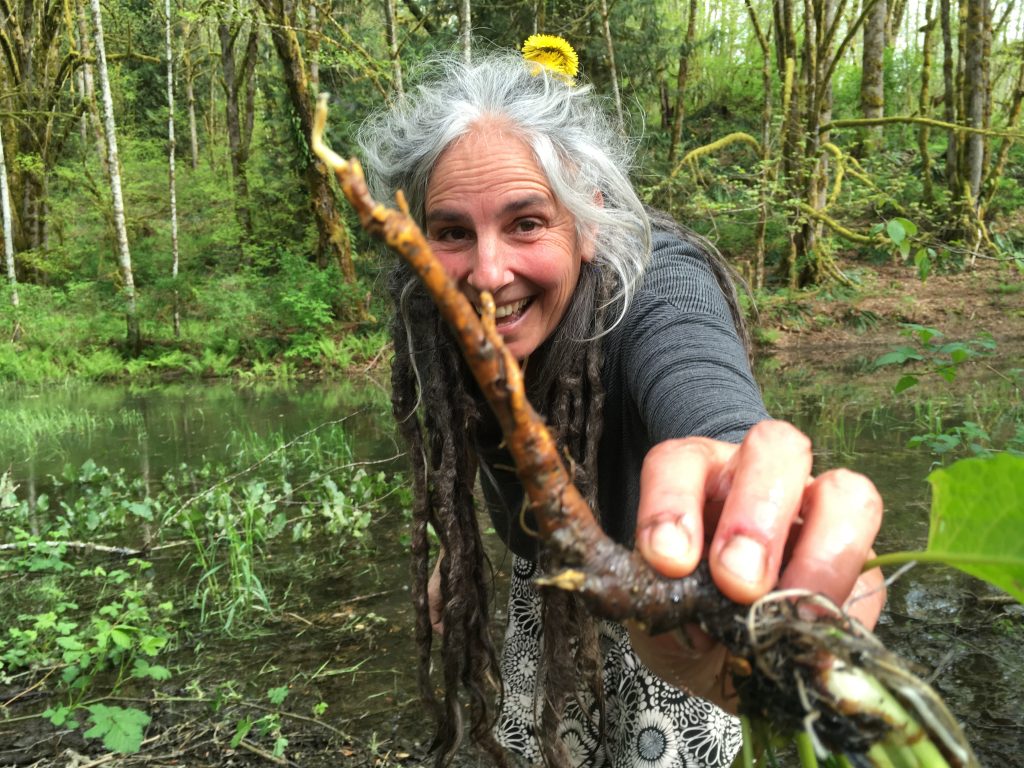
Learn with Terri Wilde, an Earth Apprentice, Permaculturalist, Gardener, Herbalist and Forager with 35+ years of hands-on experience.
- Sign up for 1-3 monthly modules of study and practice:
- Being in the Web of Life June 16 – July 10, 2025
- Dancing with the Land July 14 – Aug 7, 2025
- Preparing for the Coming Changes Aug 11 – Sept 4, 2025
In this program, you will:
- • Camp and live in community on Dandelion Hearth Farm, in the heart of the North Cascades’s Skagit River Valley (Western Washington)
- • Be engaged for 4 days a week with Instruction, Hands-On projects, Field Trips & Work Exchange
- • Spend the rest of your time exploring the beautiful North Cascades, relaxing in nature, working part time or deepening your studies
- • Learn to apply Permaculture principles to real life Earth Care!
- • Practice deep observation, getting to know the plants and animals of place through seasons and successions.
- • Learn to read the land, water, weather and plants for guidance toward good stewardship.
Program Cost:
This program is being offered for $500/monthly (per module to cover program costs.)
Plus 10 hours/week in work exchange
The Program includes Camping, Food, (including between modules) Instruction, Field Trips and Hands-On Regenerative Practice Classes
Scholarship available for qualified Bipoc applicant
Curricula Highlights:
Permaculture Practices, Sense of Place, Mushrooms, Botany, Gardening, Food Preservation, Foraging, Herbal Medicine, Energy Flows, Humanure, Animal Husbandry, Homestead Skills and More!!
Dandelion Hearth Farm is in the Skagit River watershed in western WA. We acknowledges that we are living on and stewarding the ancestral homelands of the Upper Skagit Coast Salish Peoples, Sabelxu band of the Upper Skagit, and honor with gratitude this land and the Upper Skagit Tribe.
Register for one to all three modules:
Being in the Web of Life: Observation, Sense of Place, Deep listening, Meeting Animal, Plant and Fungal Kin, Ecology, Soil, Energy Flows, Compost/ Humanure, Permaculture Ethics and Principles
Dancing with the Land: Growing food, Knowing relationship, Botany, Permaculture Practices, Foraging, Forestry politics, Invasive plants, Succession, Scythes
Preparing for the Coming Changes: Harvest, Food Preservation, Mushrooms, Herbal Medicine Making, Conservation, Assisted migration, Alternative systems (agriculture, architecture, energy, technology, human and human/earth relations, economics, land stewardship…), What matters now?
The program includes Camping (we have some structures and gear), Food, Field Trips, and Regenerative Class instruction with hands on projects.
It is being offered for $500/month toward costs, plus 10 hours a week work exchange.

Curricula for the Modules:
Module 1: June 16 – July 10, 2025
Being in the Web of Life: Observation, Sense of Place, Deep listening, Meeting Animal, Plant and Fungal Kin, Ecology, Soil, Energy Flows, Compost/ Humanure, Permaculture Ethics and Principles
Observation
Turning on our senses
Reading the landscape
Reading weather
Phenology – the changing timing of biological phenomena
Reciprocity/ Gratitude
Deep Listening
Sense of Place
Sense of place quiz… for home and here
Maps: directions, topographic, soil, lidar,
Natural History
Birds and birdsong as we go…
wildlife habitat, who do we share this time and place with?
US zones (7 here) where you are from/ going to
Deep Geology
Ecology: web of life
Food chains, mycelial networks, Mother Tree
Keystone species
Who is not here now?
Where is the line of “an organism”?
Soil
Living soil: creatures of earth/ Soil biology.
geology
types of soil
nutrients
soil tests
Energy Flows
Compost: Kitchen and Garden, Humanure, composting in situ, liquid gold
recycling, garbage
Water:
Water cycle
water over land, how it flows
water slowing
earth work
hugelberm swale/ contours
creek breaks
keyline design
ponds: macro invertebrates
microscopic observation
plants and fish
pond construction
pond care
aquaculture
water conservation: use and watering techniques
water harvesting: catchment, grey water
Botany
Knowing Relationship
Meeting plants
making plant friends
Plant parts and habits/ reproductive strategies
Plant Families
Permaculture
Ethics
Principles
Guilds/ food forests
hedgerows
form to function
nature’s patterns
edge strategies
zones
stacking functions
micro climates
Permaculture Design critique… the earth designs
Module 2: July 14- Aug 7, 2025
Dancing with the Land: Growing food, Knowing relationship, Botany, Permaculture Practices, Foraging, Forestry politics, Invasive plants, Succession, Scythes
Gardening/ Farming
Annuals
Seed Saving: planting for saving seed, hybrid vs. open pollinated, selection, population and Isolation, readiness and collection, processing and storing
sheet mulching. no till
soil enhancing practices
tool care
planting
transplanting
watering
selective weeding/ edible weeds
harvesting
cover crops
season extending
Perennials
propagation: seed, cutting, splitting, layering, grafting
mulching/ ramial nesting,
guilds/ layers, plant roles, species compatibility
long term planning
Forest management —Zone 5
Forest policy, legacy forests, clear cutting, aerial herbicide spraying, short life span/turnover
We want: protect diverse zones, old growth, legacy forests, protect water, manage with fire/ thinning/ sane harvesting, abate invasives
Succession
Map plants and weeds…observe over time how they move- weed walk and mapping Native vs. non- native. Edible weeds cooking show.
Invasive plant management strategies: ignore, manually weed, cut before seeding, dig out, mow, weed wack, plastic or cardboard (roofing : ) mulch, burning, vinegar, competition
Scythes
Potential, Using, Sharpening
Foraging:
Plant walks, Native Plants, Edible and Medicinal uses of plants. Reciprocity: propagation/ gifting, Four caveats, cooking with wild foods
Mushrooms, greens, roots, flowers, berries, nuts/ acorns (leaching)
Homestead Skills
Fire building, firewood wood processing, rocket stove cooking, stocking and rotating food, assessing food quality, cooking with what is in abundance…
Module 3: August 11- Sept. 4, 2025
Preparing for the Coming Changes: Harvest, Food Preservation, Mushrooms, Herbal Medicine Making, Conservation, Assisted migration, Alternative systems (agriculture, architecture, energy, technology, human and human/earth relations, economics, land stewardship…), What matters now?
Harvesting
Food preservation
drying, canning, freezing, salting
fermentation: kefir, sauerkraut, pickling
food storage: rotating
Herbal Medicine
Herbalism, schools: TCM, Ayureveda, European, Eclectics, Homeopathy, Aromatherapy, Botany in a Day
Herbal medicine making:
Teas (infusions and decoctions), tinctures, salves, poultices, syrups, baths
Mycology
mushroom ecology
mushroom identification
edible mushrooms: collecting/ cooking/ preserving
growing mushrooms
medicinal mushrooms
Seed saving revisited
Conservation:
sweaters, teapots, straw boxes, heat smaller spaces, hot water bottle, insulation, wood stove cooking/heating, Earth Etiquette
Alternative Energy
solar, wind, water,
Rocket stoves
solar ovens
Animal Husbandry
dogs/cats
chickens: house, feed, water, butcher
Food systems
How to find the healthy food in America and avoid GMOs, dirty dozen, wheat sprayed with round-up
Food management strategies
Eco- Building concepts
design architecture with nature
green energy
natural building
appropriate technology
Connectedness
Mycelial, Mother Tree
interwoven soil -forests -bodies- each other
extinctions
What can we do that will help now?
Andrew Boyd’s book: keeping sane and continuing to make the world better
planning for a changing climate
strategies
species
urban strategies
Bio-Remediation
Assisted Migration
Holgrems future scenarios
Community Land trusts
community living
land trusts
connections/organizations
Research Project
Topic, experiment
Presentation of Research
Extra credit teachings:
The Sky: stars, planets, constellations, astrological necklaces, phases of the moon game
Esoterica: tarot, i ching, astrology, mythology
Defensive Driving
Swimming lessons
guitar, singing, drumming
blowing and natural egg dying
Perfect Popcorn
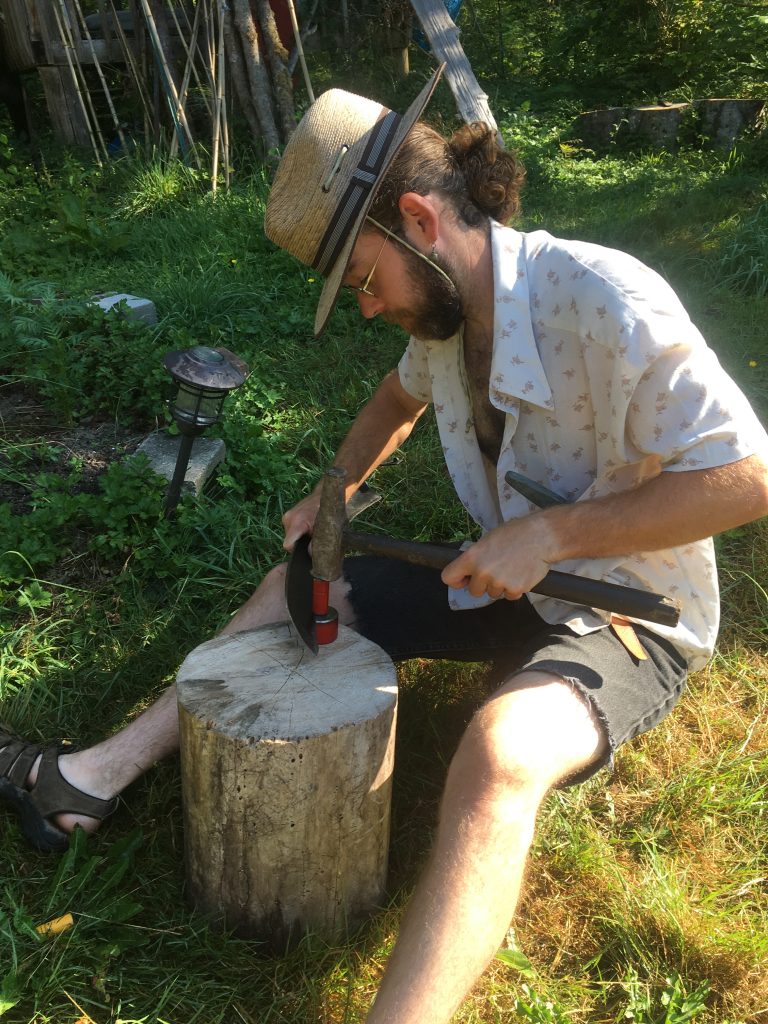
Peening a scythe
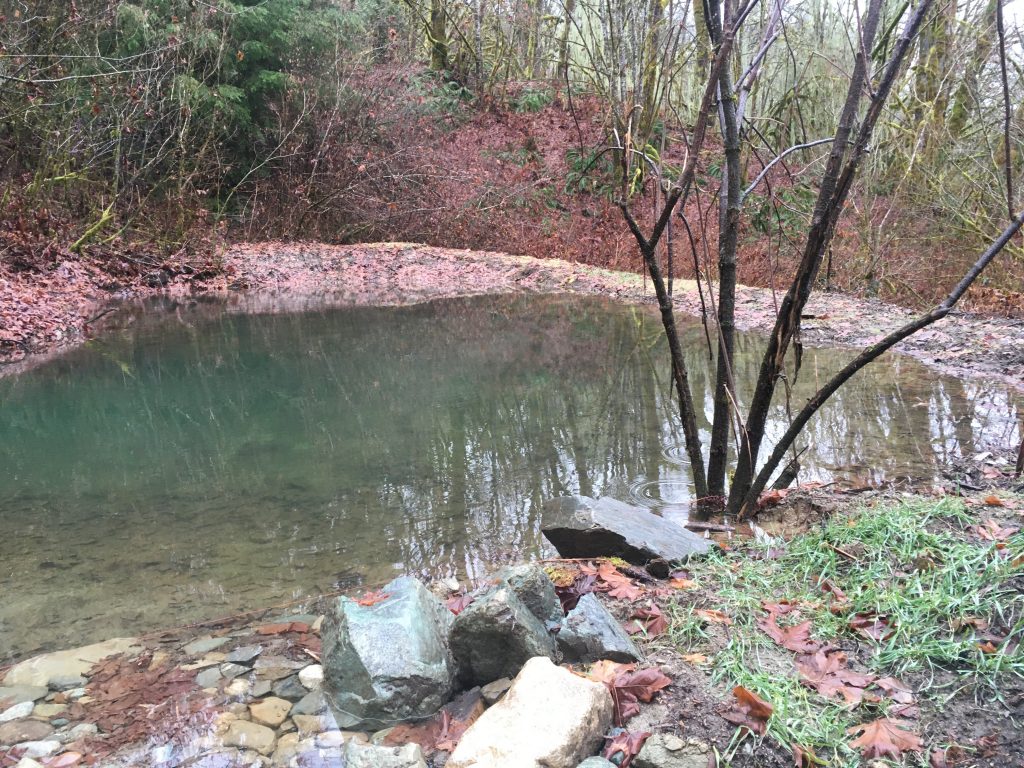
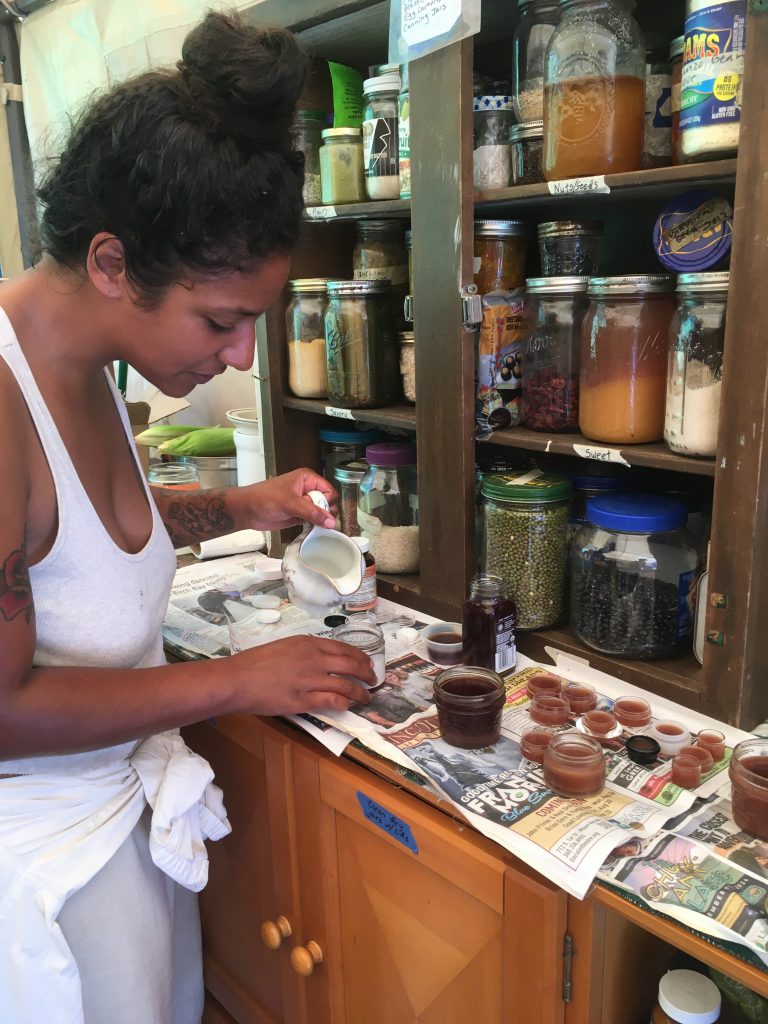
Daily Class time will include:
Check-ins and morning openers
Instruction Time
Field trips
Hands-on
Research projects
Presentations with visuals and stories
Games
Field Trips:
Rockport State Park old growth
Feral Farm
Forest Farmstead
Rodale Institute Research Center
Blue Heron Farm
Long Hearing Farm
Sauk Mountain/ alpine ecosystems
Transfer station
Farm to School
Inspiration Farm and Queen Mountain?
May include a Campout in the wilderness
Requirements: A Permaculture Design Certificate and/ or previous gardening or applicable experience or teacher permission
Expectations:
Apprentices are expected to be self-motivated, hard working, with intentions to apply their learnings during their life paths.
They shall be responsible for collective cooking shifts, and responsible for cleaning up after, and caring for, themselves.
We foster open communication and urge participants, using non-violent communication, to promptly address issues of concern.
Apprentices are expected to track, write down and complete all work exchange hours with diligence.
We treasure learning together and appreciate the sharing of knowledge and skills apprentices bring with them.
We maintain a culture of respect for the earth and each other, our needs and our differences.
Work exchange, trade and scholarship options may be available.
To be signed:
Memorandum of Understanding
Liability release form
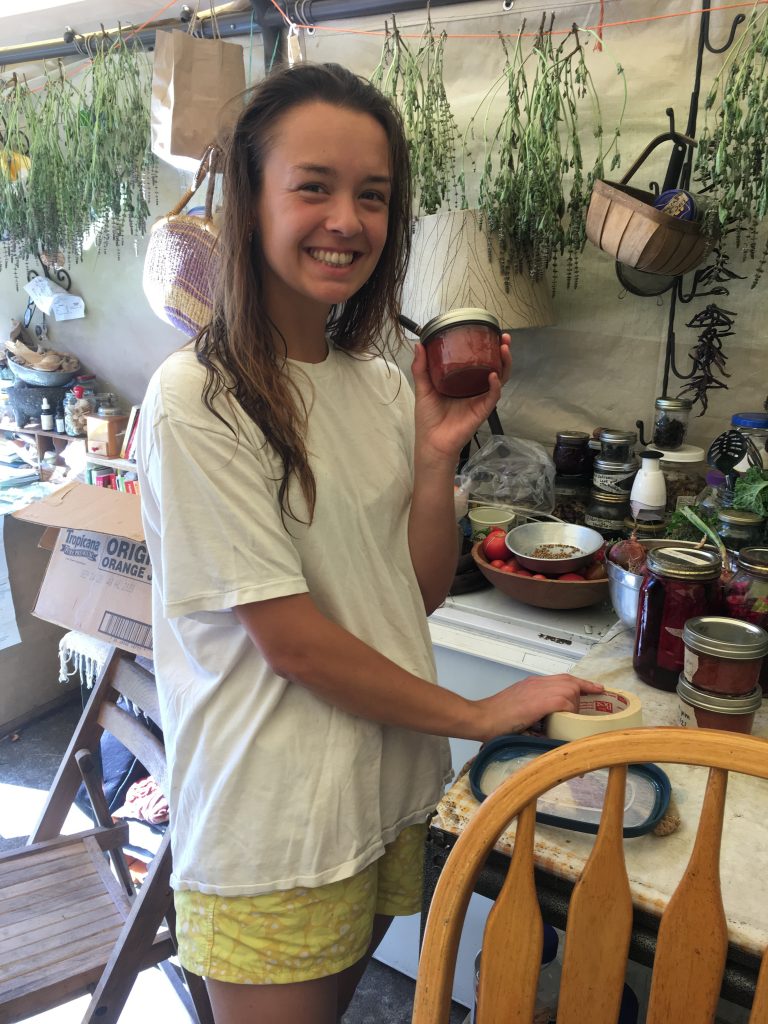
Objectives of the Course are:
*To enhance our ability to live in harmony with the Web of Life on Earth, through observation, reciprocity and careful stewardship.
*To explore healthy ways to receive our needs and revitalize ecosystems for future abundance.
*To practice living in community sharing knowledge, food, chores, company, music and fun together.
*Learn how to grow, find, harvest, prepare and preserve our own food.
*To slow down and sense what the earth is teaching and asking of us
*To be a part of the paradigm shift to a sustainable future.
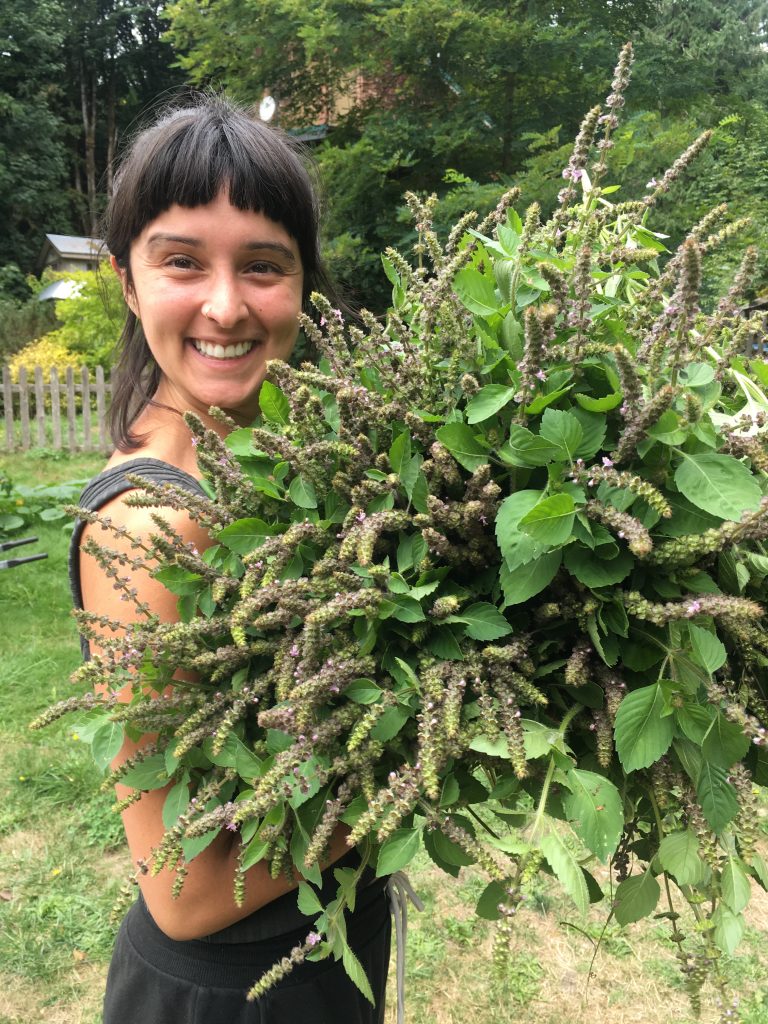
(opens in a new tab)https://www.vivaculture.org/wp/permaculture-design-live-consultation/https://www.vivaculture.org/wp/permaculture-design-live-consultation/https://www.vivaculture.org/wp/permaculture-design-live-consultation
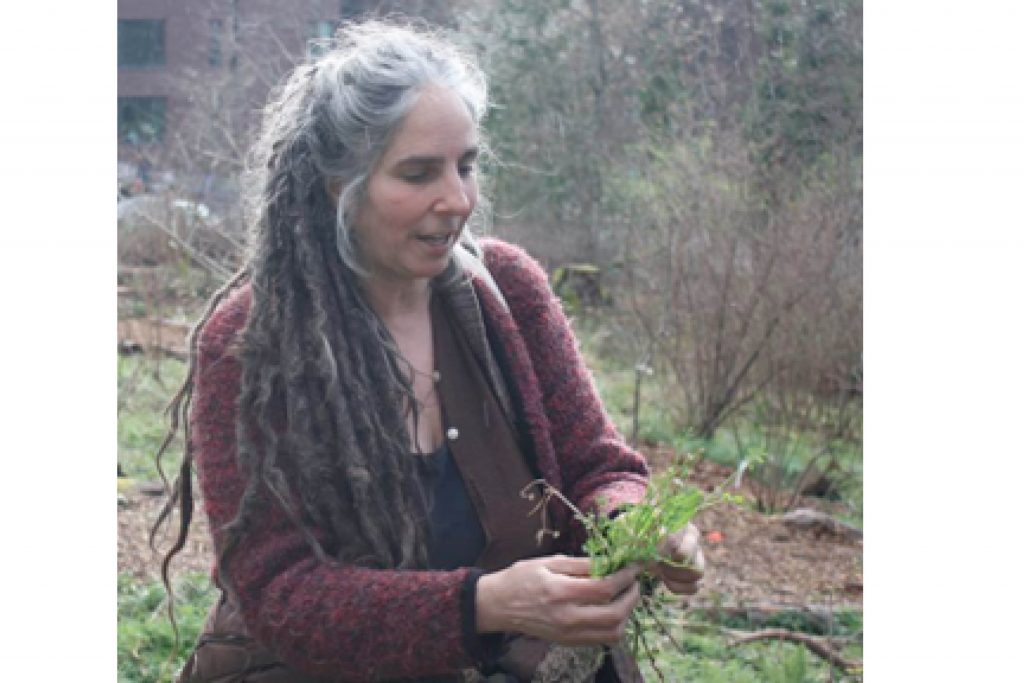
Regenerative Earth Apprenticeship Program and Vivaculture Institute founder and educator, Terri Wilde Compost,is an avid Earth Care practitioner. She has been studying, practicing, working and teaching about native plants, edible weeds, permaculture, foraging, composting, organic gardening and herbal medicine for 40 years.
Email wildefoods@yahoo.com for a full bio.


